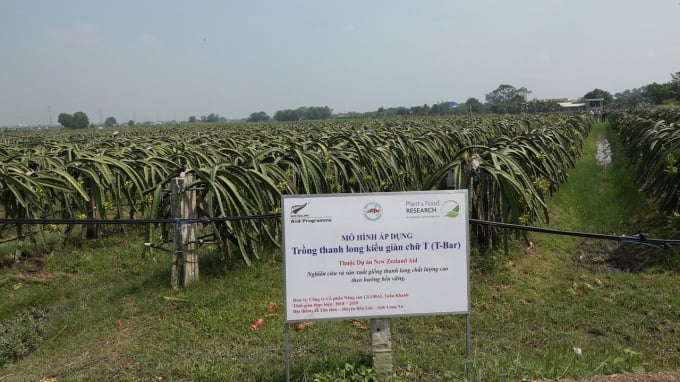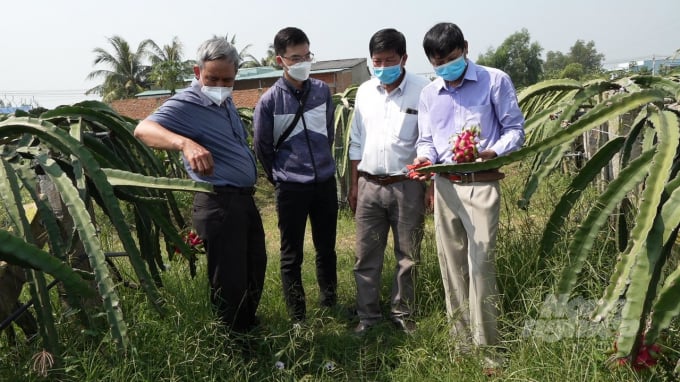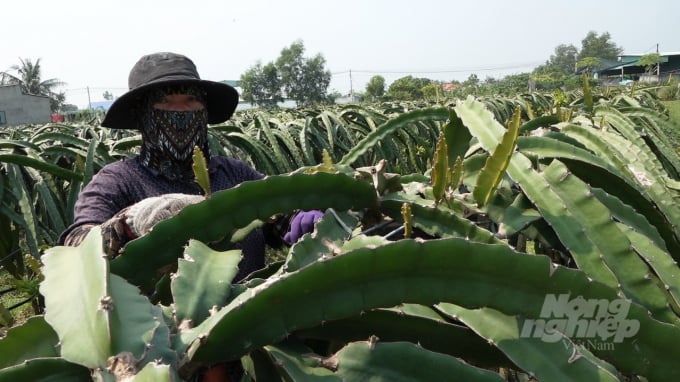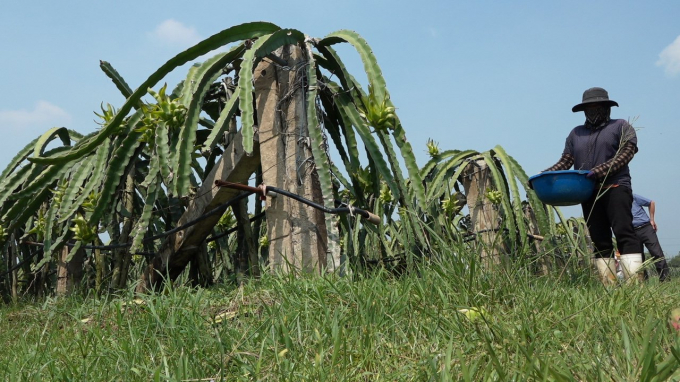November 27, 2025 | 10:49 GMT +7
November 27, 2025 | 10:49 GMT +7
Hotline: 0913.378.918
November 27, 2025 | 10:49 GMT +7
Hotline: 0913.378.918
Graduating from University of Economics Ho Chi Minh City and after nearly 20 years of working in the field of finance-marketing and taking up the position of deputy director of a tourism company in Tien Giang, Khanh still decided to do a U turn.
Khanh was born and grew up in Ben Luc district, one of the largest dragon fruit growing of Long An province, he realized that dragon fruit plant could be a potential crop to start a business. With the thought in mind, Khanh decided to leave the city for his hometown to build a brand for his hometown's dragon fruits.

Vo Van Khanh has developed a dragon fruit garden with GlobalGAP standard, Photo: Minh Sang.
Khanh said in 2019 he decided to switch his family's three-hectare dragon fruit garden into a GlobalGAP-standard dragon fruit farm.
Although Khanh was a amateur farmer with the lacking of farming skills and knowledge, as a brave person who had many years of working in finance and marketing field he learned new knowledge by himself. He went and visited many models of dragon fruit cultivation within and beyond his province. He even visited agricultural institutes and universities to learn the techniques and methods of growing dragon fruit.
At the same time he learned new farming skills from the internet to apply to his garden.

Khanh's dragon fruit garden has got GlobalGAP certification. Photo: Tran Trung.
Thanks to his tireless efforts, in May 2021 his dragon fruit farm got GlobalGAP certificate. Despite the complex situation of the coronavirus pandemic his fruits could still enter the highly-demanding market such as the US and Japan.

Vo Van Khanh (right) was introducing his organic-standard dragon fruits to his partners. Photo: Tran Trung.
According to Khanh, growing organic dragon fruit was not complicated. Importantly, the growers must follow the requirements of fertilizer and pesticide use and quarantine period. Especially, all the process of dragon fruit production must be recorded on a daily basis through digital transformation to make traceability more convenient.
Growing dragon fruits with GlobalGAP standard is very specific job. Ensuring environmental hygiene is the most difficult part of the farming process. It's necessary to remove old, disease-infected and fruitless stems. This activity will create a huge amount of crop residues that can provide an environment where pathogens can flourish if they are not treated properly.
Specifically, a dragon fruit plant can have 10-12 kilo of unnecessary or disease-infected stem. There are around 1,200-1,300 wooden or concrete posts in a garden on average. As a result from 12-15 tons of stem must be pruned every year.

From 12-15 tons of unqualified stem per hectare unit must be removed which will be a burden for living environment. Photo: Minh Sang.
Burying or burning was not a good way to deal with the cut stems. Therefore, Khanh thought "why don't we turn dragon fruit stems into fertilizer to both return nutrients to the soils and protect environment and saving money?"
From that thought in mind, Khanh once again went to the Southern Fruit Research Institute to suggest the idea and find answers. Thanks to the advices and guidelines from the experts of the Institute he came up with a method of composting to create tens of tons of organic fertilizer every year.

Khanh has also taught other local farmers how to make compost from cut dragon fruit stems. Photo: Tran Trung.
According to Khanh, it was necessary to find out a suitable bio-product to converse the stems into organic fertilizer.
Through the Long An Gardening Association, Khanh finally found an optimal product for his conversion of dragon fruit stems. The cut stems were chopped into small pieces and dumped into a big hole paved with plastic tarpaulin to avoid the direct contact with soil and water. Then the bio-product was mixed with the organic matter. One kilo of bio-product could make 3-4 tons of compost. After one month the compost could be ready for use. The compost not only helped the plants grow stronger but also helped farmers reduce fertilizer use by 30-40% every year.

The compost not only helped the plants grow stronger but also helped farmers reduce fertilizer use by 30-40% every year. Photo: Tran Trung.
According to Long An's Department of Agriculture and Rural Development, the province had 2,100 hectares of dragon fruit applying high technologies in farming. The local competent agencies have designed a pilot model of hi-tech dragon fruit cultivation on 842 hectares to meet the standards of VietGAP and GlobalGAP.
"These models have helped local farmers gradually get acquainted with applying of organic fertilizers, bio-fertilizers and bio-products in dragon fruit cultivation. The approach can not only boost the activity of the roots but also create a habit of recording daily farming activities in accordance with VietGAP and GlobalGAP standards. In which making compost from the cut dragon fruit stems is a good model that should be multiplied," said Nguyen Chi Thien, Deputy Director of Long An's Department of Agriculture and Rural Development.
Translated by Mai Tham

(VAN) Tay Ninh’s livestock sector is undergoing a major transformation, applying high-tech, closed-loop circular models to build sustainable value chains.
/2025/11/26/3627-4-082628_818.jpg)
(VAN) From a small café on the red basalt highlands, Le Van Hoang started a business with clean coffee, building Enjoi Coffee into a symbol of organic agriculture in the Lam Dong plateau.
/2025/11/25/0045-1-135246_13.jpg)
(VAN) Ca Mau is researching a model of sea-encroaching embankments combined with viaducts and logistics service zones, aiming both to prevent erosion and create land funds for marine economic development.

(VAN) The information was shared at the seminar 'Urban Agriculture - Solutions for Developing Green Spaces,' organized by the Kinh te & Do thi Newspaper and the Biotechnology Center of Ho Chi Minh City.
/2025/11/19/4141-2-132831_216.jpg)
(VAN) One of Japfa's outstanding solutions is implementing digital transformation and artificial intelligence (AI) to optimize operations, enhance productivity, and advance sustainable development.
/2025/11/19/4847-1-093540_448.jpg)
(VAN) The Gia Lai Provincial People’s Committee had a working session with the delegation of the U.S. Department of Agriculture, the State of Idaho, and representatives of the State's leading enterprises.

(VAN) Ca Mau has a sufficient foundation to become a strong regional aquaculture center, where production integrates the economy, the environment, and the lives of the people.